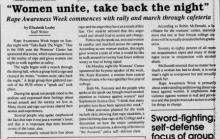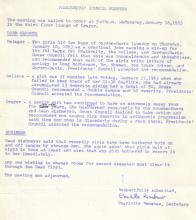President's Council Minutes: Procedure for Women Being "Bothered "
During the Presidents' Council (Women's Interdormitory Council) meeting of November 8, 1961 women were advised of how to react when bothered at night:
"Annoucements: Whenever girls are bothered by anyone on the way to their dorms at night, they should report the matter to Dean Wishmeyer immediately."
President's Council Minutes: All-College Dance Concerns
During the Presidents' Council (Women's Interdormitory Council) meeting of October 18, 1961, issues related to the (upcoming) all-campus dance were discussed, including dorm closing procedures and the saftey of women walking home from the dance:
"Other Discussions: Suzy Cooper explained the dorm closing proceedure [sic] on the night of an all-college dance. The Council was asked to think about the problem of girls walking home alone to dorms on the outskirts of campus."
Concerning Automobiles
"Concerning Automobiles" lists the rules and regulations governing female students and transportation. No women who lives in a dorm on campus was permitted to keep a car in Carlisle unless speical permission was granted. This was to ensure their safety and prevent automobile accidents involving students. However, female students were allowed to ride in automobiles during the day without permission if the distance was short and the trip was for less than an hour.
Saturday Social Programs
Like the permission forms for an automobile and absences from meals, these two slips provided information for the College/ dormitory regarding its female students' whereabouts and plans for Saturday. It required information regarding places and times of social programs and the evening meal, and who would be escorting that woman. The evening slip also provides spaces for listing movies location and dance locations. This ensured the safety of female Dickinsonians.
Absence from Meals
Any absence from a class, college event, or even meal required notification or a pass for an excuse. The College required its female students to provide information about their location if they could not make College or dormitory functions. In an era without cell phones, knowledge regarding female students' welfare and location were considered critical in protecting its students.







